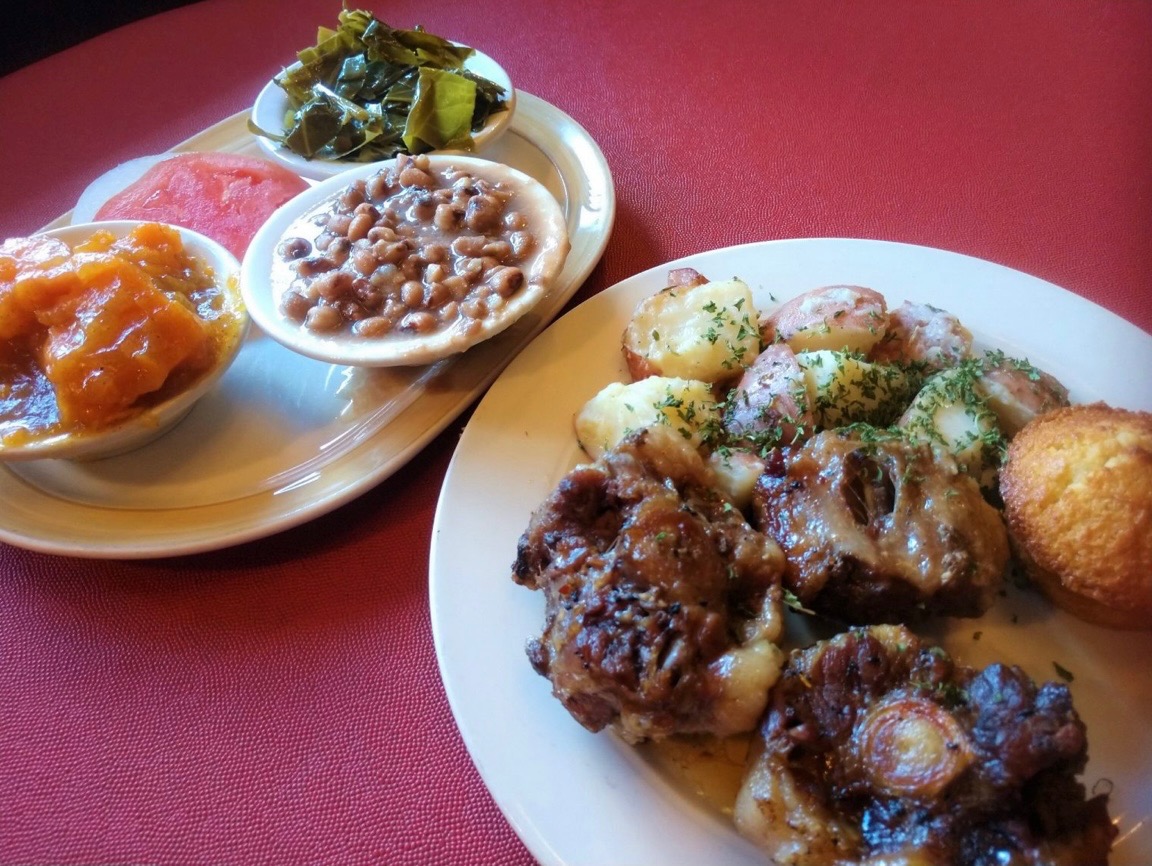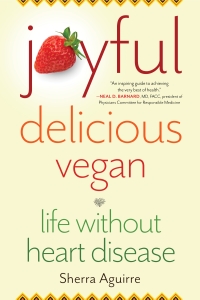Soul Food Liberation!
An American Legacy
The popular Netflix series High on the Hog explores African influences on American food and how slavery shaped our “soul food.” Fresh fruit and vegetables were a significant part of the agriculture and diet of the Africans who were brought here as slaves. With their labor, they built an economy based on cotton that would propel the US into one of the world’s leading economies. Their farming and culinary skills were also at the service of their owners, and they were given for their own use whatever the plantation owner did not want or could not sell for a profit. Despite living off the parts of farm animals that owners did not want to eat and plantation crops likely not fit for sale, African slaves and their descendants created dishes that are still celebrated today. Foods like cornbread, collard greens, and even mac and cheese had their beginnings in black American food culture.

(Photo Credit: Anne Braly)
Because these foods are so delicious, most of us continue to eat them prepared in the same way our parents and grandparents did. We do this even though many of the conditions that shaped this chapter of our food history have changed. As I note in Joyful, Delicious, Vegan: Life Without Heart Disease, few people ever stop to think about the conditions that gave rise to our Southern food traditions. In the rural American south in the seventeenth and eighteenth centuries, most people had no choice but to eat what they produced. There was limited availability and a variety of herbs and spices, which now are easily available. These limitations were certainly true for the slaves and their immediate descendants who perfected dishes of cabbage greens, black-eyed peas, turnips, and so much more. They seasoned with what they had available—salted pork cured or smoked to preserve it without refrigeration. These are signature Southern dishes handed down from generation to generation and are still prepared much the same way.
Our Health Situation Today
Despite advances in medical technology and pharmaceuticals, today, African Americans and other communities of color are leading the national epidemics of heart disease, diabetes, obesity, and other food-related illnesses. And the 2020 pandemic showed that these underlying chronic conditions contribute to greater death rates from viruses like COVID-19. As a community, we are still at the bottom rung of the economic ladder, which means less access to fresh whole food or quality healthcare. The good news is that we can use our history of resilience and creativity with food to make a difference in our personal health and the health of our communities.
We now know several things that were not widely known in the rural South of the 1800s when our great-great-grand-parents used the foods and cooking methods available to them to create a food culture that is still celebrated today for its great taste and lasting appeal:
- Excess salt and fat are not healthy.
- Boiling or otherwise overcooking vegetables destroys many enzymes that we need to assimilate their nutrients and can destroy some nutrients as well.
- Using a variety of vegetables, nuts, seeds, grains and flavoring them with spices such as garlic, onion, cumin, oregano, paprika, coriander, and countless others in fresh or dried condiment form can produce virtually the same flavors as adding pork, beef, or chicken, and sometimes even slightly more interesting and varied ones. They also add healing properties to our diet.
- Meat and dairy, in general, are not the best sources of protein or nutrition and create inflammation in our bodies, particularly as we age.
- Processed meats like bacon, cold cuts, hot dogs, and smoked turkey increase the risk for cancer. The science is clear, and the American Institute of Cancer Research recommends avoiding them.
How Do We Do This?
In recent years, significant numbers of people, like many of us, raised on soul food, use current nutritional knowledge and a wide variety of fruits, vegetables, grains, nuts, legumes, and spices to recreate dishes in equally delicious yet healthier ways. Cooking time for greens like collards has been cut to twenty minutes or less from several hours, and many of us have eliminated the meat altogether and steam or sauté collard or turnip greens with spices for even a shorter time to achieve the same taste in much healthier versions.
In summary, here are some important things we can do:
- Make nutrition information available to families and communities through outreach to health care, community and civic organizations, and churches.
- Reduce/remove animal products from our everyday diets to reduce inflammation, and eliminate their contribution to heart and other chronic illnesses.
- Provide resources to teach healthy plant-based cooking on a budget and ways to make healthy tweaks to favorite meals.
African American cookbook authors like Bryant Terry, Tracye McQuirter, Jenne’ Clairborne (AKA Sweet Potato Soul), and many local vegan chefs are contributing to the liberation of soul food from slavery’s restrictions. Our challenge is to take inspiration from these new creative voices and use our own creativity to adapt the foods and dishes we love to feed our souls and our health!


